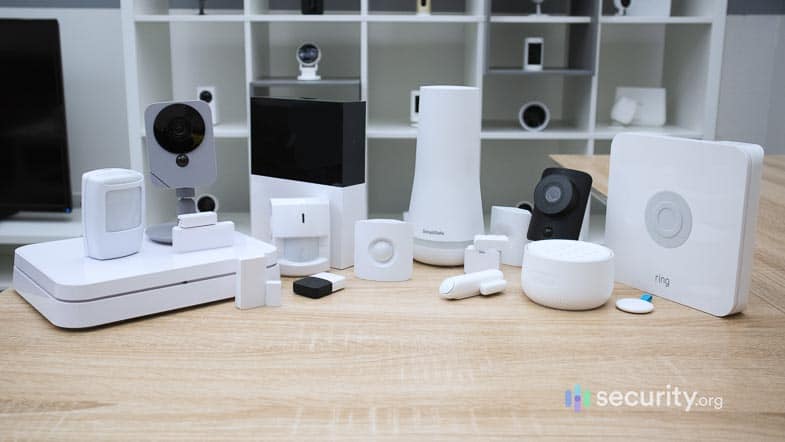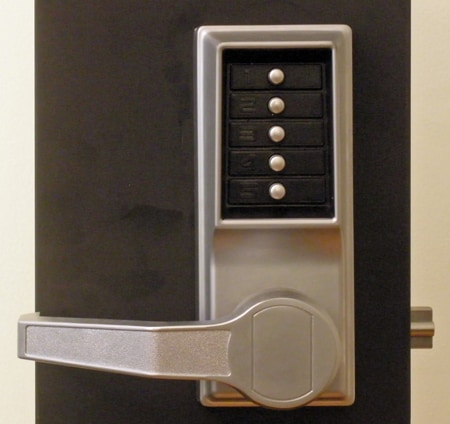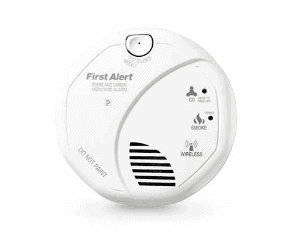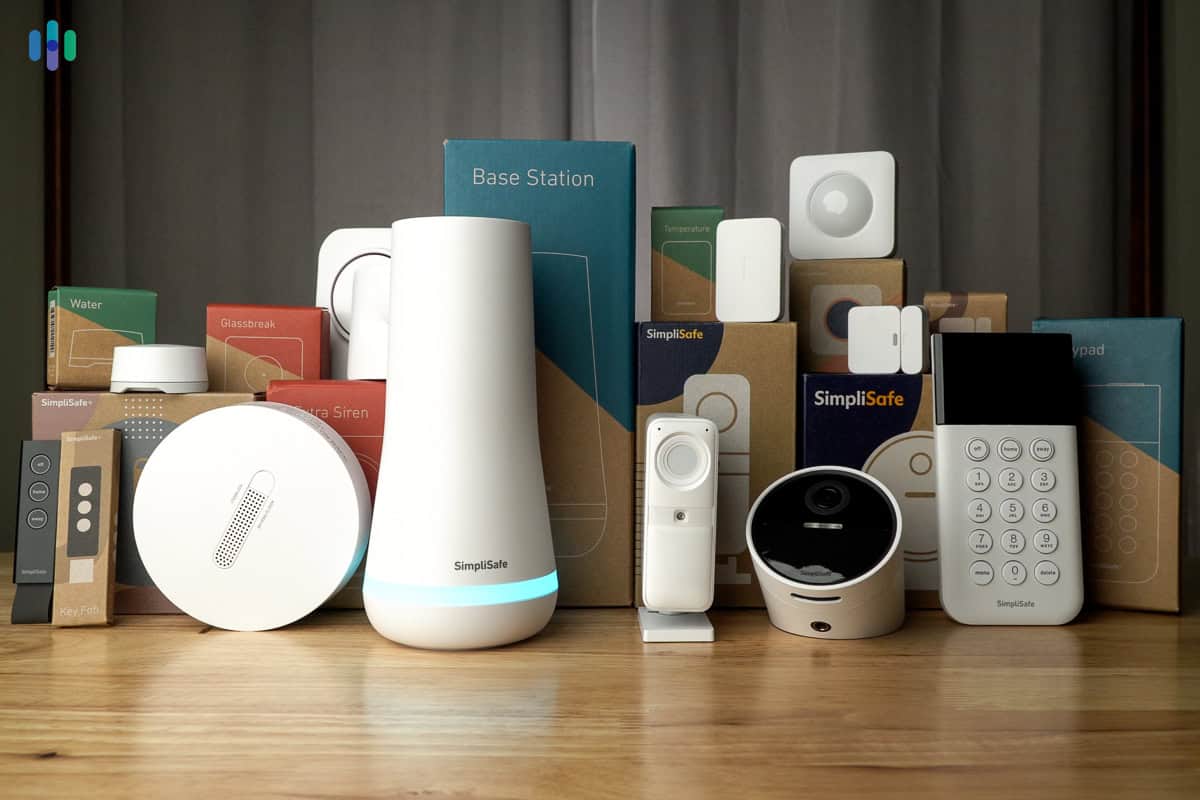As you probably know, we test dozens of security systems every year. And when we test them, we don’t just try out their features. We go full blast and examine how everything works, from pairing them with Alexa and Google to disabling the systems themselves.
You’re probably wondering why we do that. Well, when you live with a security system like we do, you start to realize that things don’t always go as expected. One of the things most people don’t expect are false alarms, but it happens. It happens even to the best security systems, and when it does, knowing how to disable your alarm comes handy.
In this guide, we’ll give you instructions on how to disable your home alarm system in case you experience a false positive.
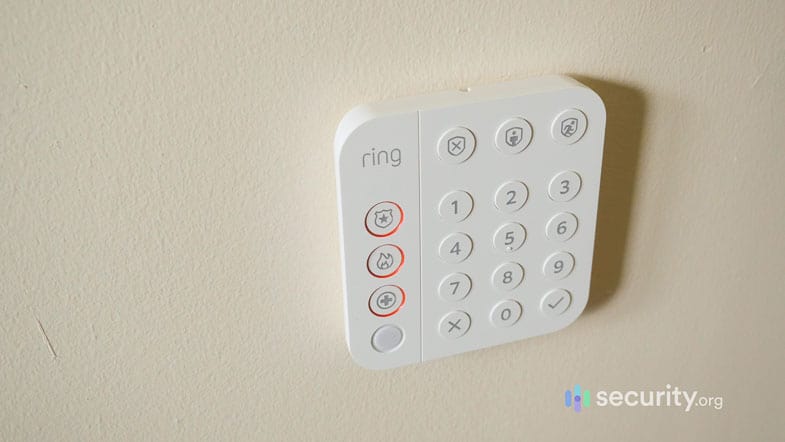
How To Disable Home Security Alarms
Home security sirens are loud. In our experience, they are usually in the 85 to 105 dB range – loud enough to wake you up if someone breaks into your home in the middle of the night. But if it’s a false alarm, a siren is irritating. You might even catch the irk of your neighbors.
If your home security system blares the alarm for apparently no reasons, here’s how to deal with it.
- Make sure it’s safe. First, make sure that you aren’t currently being burgled. If you are, here’s how to survive a home invasion and here’s what to do after a home break-in. If not, continue through the steps below.
- Enter your code. The quickest way to shut off an alarm is to enter your code to the control panel. Most of the security systems we test also have apps through which you can cancel the alarm. In any case, you must know your disarm code.
- Change your batteries. Not all beeps coming from your security panel are alarm sirens. A low or dead backup battery may cause the beeping. You can replace or remove it by opening your control panel, identifying the battery, disconnecting it from the circuit board, and reconnecting a replacement battery (red wire then black wire).
- Check your transformer. If your keypad says something like “no AC,” you may have a loss of AC power from a wall outlet. The issue can be in the transformer itself or in the wall outlet. First, check that the plug is connected securely. If it’s not loose, you may need to consult an electrician regarding your outlet or circuit breaker. In the meantime, unplug the transformer so the beeping stops.
- Fix your landline connection. At this point, security systems don’t need landlines; most have either Wi-Fi or cellular backup. But on the off chance that you have a security system with landline backup, the issue could be with your landline. Pick up your phone; if you don’t hear a dial tone, the line is dead and you’ll need to get it fixed.
- Read your user manual. If that doesn’t work, consult your user manual, and contact the alarm company if that doesn’t have the answers.
Pro Tip: If your security system comes with smoke alarms that won’t stop chirping, here’s how to turn off your smoke alarm and fix it.
Do You Need an Alarm Code?
The alarm code is the numeric or alphanumeric code you enter your keypad to disarm your security system. And yes, most systems today still require an alarm code, even security systems with apps or voice control with Alexa and Google Assistant. The top security systems that work with Alexa, for example, required us to dictate our alarm code to disarm our alarm. That’s an option, but we don’t recommend loudly speaking your alarm code even in your own home.
As for which method is best used for entering your alarm code, we’d say that the traditional security panel or the app are the best. Go with the app for convenience – being able to arm and disarm our security system from the couch never gets old. As for the security panel, which is the keypad most of us place near our front doors, it’s best used for arming and disarming the security system when coming and going.
Alarm Code vs. Safety Passcode vs. Duress Code
Besides the alarm, there are other codes you have to remember if you have a security system, especially one that is professionally monitored. Memorizing these codes can also help you disable the alarm when needed and cancel police dispatch during a false alarm. So let’s distinguish the alarm code, safety passcode, and duress code.
- Alarm code: As explained above, this is the code you’ll need to disarm or disable your alarm.
- Safety password/safe word: If your system is monitored, chances are that it already notified the monitoring center soon after it started blaring the siren. That means it will only be seconds until the monitoring center gets in touch with you. However, you can’t just simply cancel an alarm call. You’ll need to provide them your safe word to confirm that it’s you and not a home invader pretending to be you. Only after providing your safe word will the monitoring center cancel the alarm.
- Duress code: Let’s say there’s an actual home invasion, and the trespasser asks you to cancel the alarm under threat of violence. In situations like that, enter or give the monitoring center your duress code. They’d respond as if the alarm had been cancelled, but will notify the police after ending the call.
Memorizing those codes (and keeping them unique) will help you take action both in case of a false alarm or a real emergency.
How Thieves Choose Which Homes To Rob
A study from the University of North Carolina’s Department of Criminal Justice & Criminology surveyed 422 convicted burglars across North Carolina, Kentucky, and Ohio, asking them how they chose which homes to rob. The burglars said these were deterrents for them:
- Lack of escape routes
- Alarm signs
- Alarm systems
- Outdoor cameras
- Dogs
- High-traffic areas
- Nearby neighbors
- Police
- People home
- Surveillance equipment
Most burglars tried to determine if homes had alarm systems before they robbed them. Specifically, 60 percent of burglars said that if they found a home had an alarm system, they would choose another target, and half would discontinue the burglary if they found an alarm during it.2 So, if you’re wondering if security systems and security cameras deter crime, the answer is a resounding yes.
How Do Burglars Disable and Hack Alarms?
Of course, alarms don’t deter all burglars. The more advanced burglars can:
- Take advantage of power outages. If you have a hardwired security system that depends on your home’s power and doesn’t have any cellular or landline backup, power outages are ideal times for burglars to rob your home. That’s why it’s important to have backup batteries and either cellular or landline backup to keep you connected to your monitoring center at all times.
- Use alarm codes. Whether it’s stored on a hacked phone or written on your fridge that’s visible from your window or door, thieves can take advantage of alarm codes if they figure them out.
- Cut off communication. Some thieves cut phone lines and wires to power off alarm systems that have landline backup.
- Exploit vulnerabilities. Although it’s not common, security systems have been hacked before. Wireless security systems that connect to Wi-Fi are particularly vulnerable to hacking, especially if their apps lack authentication and/or encryption, which makes signal interception easier for hackers.
How To Prevent Burglaries
As we’ve seen, security systems deter most burglars from robbing houses, but they’re not the only way to prevent home invasions.
- Install a home security system with cameras. Your best defense against burglaries is a security system, ideally one with security cameras. Find out how much security systems cost, whether you need a permit for home security, how much security cameras cost, how to install security cameras, and how to install security cameras outside.
Top Home Security Systems - Use smart locks. Especially if you need to let people in when you’re not home, smart locks are much safer than leaving keys under fake rocks. Smart locks let you open and close your home remotely or, even easier, give guests temporary passcodes. Learn more about the best smart locks on the market.
SimpliSafe Smart Lock - Use smart lighting. Burglars are deterred if they think someone is home. Of course, you can’t stay home all the time (unless you’re an agoraphobe or following national stay-at-home orders), but you can make it look like you’re home all the time with smart lights. With away modes, you can have smart lights, or smart light switches, turn on and off when you’re not home to make it seem like you are. That’s way more convincing than leaving your lights on, not to mention more cost-effective. Speaking of price, find out how much smart lights cost.
Recap
Hopefully, we helped stop that annoying beeping that’s keeping you up at night, but remember, that beeping probably occurred for a reason. Whether it’s an actual burglary or low battery, be sure to fix the problem so you can have your home alarm system up and running to protect you and your family.
FAQs
Is your alarm still beeping? Let’s bring in the big dogs with these frequently asked questions.
-
How do I get my security system to stop beeping?
Follow these steps to get your security system to stop beeping:
- Make sure it’s safe (no break-ins occurring).
- Enter your code.
- Change your batteries.
- Check your transformer.
- Fix your landline connection.
-
How do you turn off a burglar alarm without the code?
Take these steps to turn off a burglar alarm without the code:
- Make sure that no burglary is taking place.
- The issue might be with your dead or low batteries (for wireless systems). Check and replace them if needed.
- For hardwired systems, you may lose power if your transformer/outlet connection is loose or your outlet or circuit breaker is faulty. Check your transformer and, if necessary, call an electrician.
- For landline systems, see if your line is dead. If it is, that is causing the issue and you’ll need professional help to fix it.
-
How do I silence my ADT low-battery alarm?
To silence your ADT alarm, press the OFF or # button on your keypad. If your system continues to beep, consult your user manual; you may need to order a replacement battery.
-
How do I turn off my Protection 1 alarm?
Follow these steps to turn off your Protection 1 alarm:
- Unplug the alarm panel box’s power supply and battery. You can usually find these in a utility closet, basement, or garage. Look for a metal box, usually gray.
- Once your box has powered down, plug back in.



